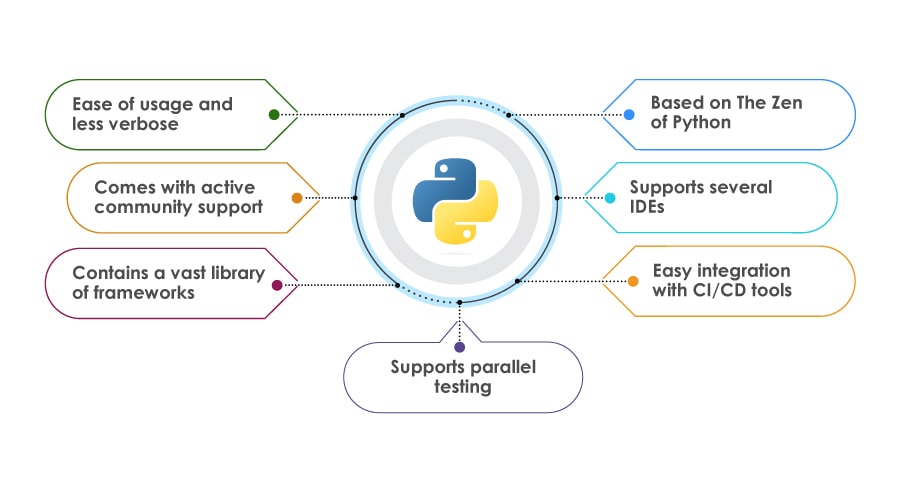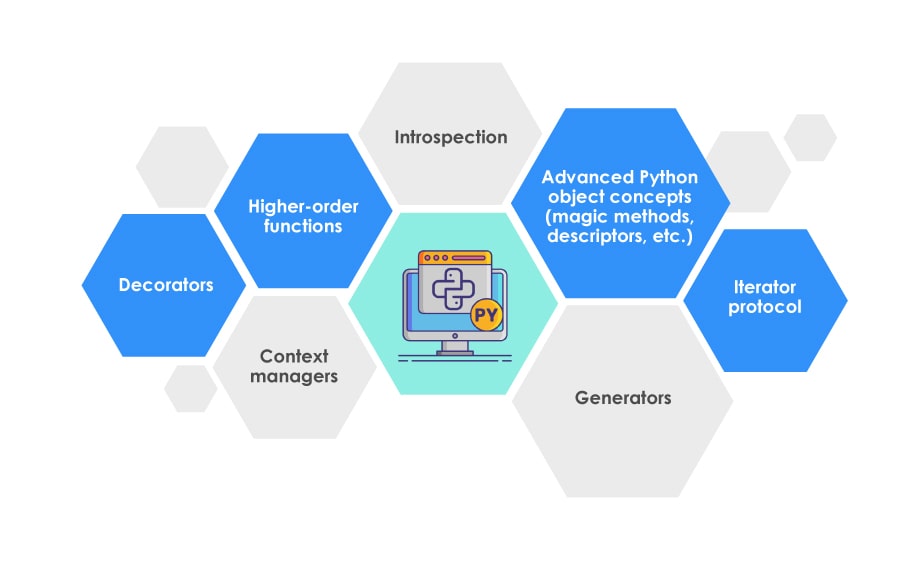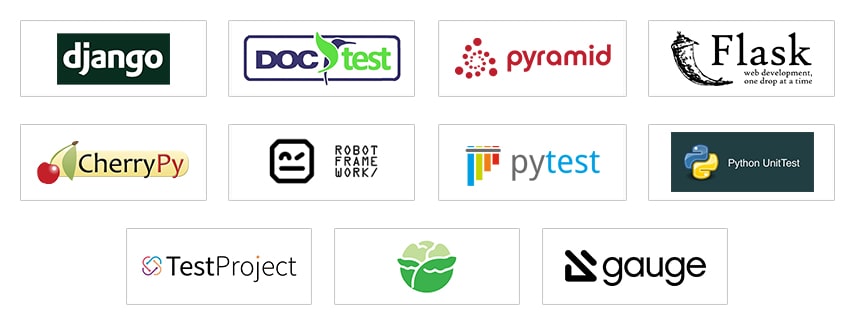Published: 31 Aug 2022
Python Testing Framework – An Informative Guide
Last Updated: 14 Dec 2023
Contents
1. Python testing framework overview
2. Why do testers prefer Python testing frameworks for test automation?
3. Python testing framework building blocks
4. Comprehensive list of Python testing frameworks
5. Why Selenium with Python is a good choice for developing a Python framework?
6. What are the best practices for Python Unit Testing Frameworks?
7. Basic testing types in Python
8. Conclusion
Today’s businesses need faster software feature releases to get high-quality products and wish to market early without compromising software quality. The faster release of new features or bug fixes in existing features necessitates robust end-to-end software testing to ensure successful deployments. While small applications or software can be handled through manual testing, large and complex applications need dedicated resources and technologies such as java or python testing framework, automation testing tools, etc. to ensure maximum test coverage in less time to get faster and quality releases.
To perform test automation, businesses should leverage robust test automation frameworks developed using different programming languages. Python is one such important language used to develop robust test automation frameworks. Testers widely use Python testing frameworks to get effective testing outcomes.
Python testing framework overview

Python testing framework is a dynamic test automation framework developed using Python programming language, which is considered easy to use for web development and test automation. Since Python is an open-source programming language, many
frameworks are based on python, making it hard for testers to determine which test automation framework to choose from the variety of available options.
Why do testers prefer Python testing frameworks for test automation?

• Ease of usage and less verbose
• Comes with active community support
• Contains a vast library of frameworks
• Supports parallel testing
• Easy integration with CI/CD tools
• Supports several IDEs
• Based on The Zen of Python
Python testing framework building blocks

• Decorators
• Context managers
• Higher-order functions
• Introspection
• Advanced Python object concepts (magic methods, descriptors, etc.)
• Generators
• Iterator protocol
Comprehensive list of Python testing frameworks

Django:
It offers some distinguishing features like ORM, URL routing, and database schema migration, making Django highly scalable and versatile. Django offers ready-made components for rapid development, and the framework is embedded with enhanced security features.
Doctest:
It is a simple yet powerful python testing framework in which tests can be written in line with the code. Testers use Doctest to perform regression testing by confirming if the interactive examples from a test file or object work and perform as expected. As a result, the documented Python statements are converted into test cases.
Pyramid:
It is an open-source framework that can run well with small and large applications. Pyramid is a highly valued Python framework due to its extensive scalability, flexibility, and testability.
Flask:
This Python framework provides tools to facilitate the web development process. Flask is relatively easy to learn and understand and provides a great environment to build functional applications. Flask has a modular design, making it adaptable for various development processes. This platform provides integrated support for unit testing and has Google app engine compatibility.
CherryPy:
This object-oriented web framework provides a production-ready WSGI thread-polled web server. Python developers use this framework to create portable database-driven web apps. CherryPy has inbuilt tools for static content, encoding, caching, and testing.
Robot Python Testing Framework:
It is a test automation framework used for acceptance testing, acceptance test-driven development (ATDD), and Robotic Process Automation (RPA). It is based on the Keyword Driven Testing approach; thus, it allows testers to create test cases easily without any coding experience. It supports all OS and applications (web, mobile, and desktop).
Pytest:
It is a web automation testing framework that supports unit testing, functional testing, API testing, etc. Pytest supports the Test Driven Development approach and parallel test execution through the pytest-xdist plugin. Pytest is compatible with Unittest, PyUnit, and other Python testing frameworks.
PyUnit:
It is a default Python test framework part of the Python standard library. Unit test is a derivative of the xUnit framework and has some similarities. It comes with an easy installation and configuration option, thus making UnitTest Framework one of the most preferred Python Unit testing frameworks.
TestProject:
It is a free and open-source complete automation testing framework. Testers can quickly develop test cases for mobile, web, or generic automation using this framework. It is a single-agent executable and comes with third-party libraries needed to develop and execute test automation for web, mobile and generic. It generates free automatic reports in PDF and HTML formats.
Lettuce:
This Python behavior-driven development framework is based on Cucumber. It supports the Gherkin language, making it easier for non-technical testers to create automated tests.
Gauge:
This open-source framework was developed by the same people who created Selenium. It allows cross-browser functionality testing and can be easily integrated with DevOps CI/CD pipeline. It supports all major plugins, languages, and command lines.
Why Selenium with Python is a good choice for developing a Python framework?

Selenium is an open-source software testing tool that supports various operating systems and browsers like Chrome, Firefox, Safari, etc. It allows scripting in multiple languages like Java, Python, Ruby, C#, etc. Selenium is a tool suite with three components: Selenium IDE, Selenium WebDriver, and Selenium Grid. By leveraging the Selenium tool, testers can perform various tests, such as smoke, sanity, UI, regression, and more. Python language is used with Selenium to perform testing. Python API helps connect with the browser through Selenium. Python Selenium combination can be used to write functional/acceptance tests using Selenium WebDriver.
Reasons why Selenium and Python testing frameworks are preferred:
• Python is easy to code which makes test script creation extremely easy for testers and is used along with Selenium
• A large number of testers/programmers are well aware and familiar with Python language; therefore, they prefer Python with Selenium for test automation
• The binding of Python and Selenium offers a simple API to write functional tests by utilizing Selenium WebDriver
• Python is comparatively faster than other languages; thus, it makes Selenium automation testing very fast
• Active community support and open-source availability of Python language is another reason that makes it suitable with Selenium
What are the best practices for Python Unit Testing Frameworks?

• Prioritize writing test cases for sections with minimum dependencies on external resources
• Tests should be logical, simple, and independent of other tests
• Each unit test should be named precisely and documented appropriately
• Testers should create and run unit tests that cover exceptions
Basic testing types in Python

Unit Tests:
This tests specific methods and logic in the code. Unit tests are the most granular type of test with the goal of verifying the internal flow of the method, as well as making sure edge cases are being handled.
Feature Tests:
This tests the functionality of the component. A collection of unit tests may or may not represent a Feature test. The goal is to verify that the component meets the requirements given for it.
Integration Tests:
This tests the entire application end-to-end. The goal is to guarantee the stability of the application. When new code is added, integration tests should still pass with minimal effort.
Performance Tests:
This tests the efficiency of a piece of code, and the size of the code can range from a method to the whole application.
Conclusion
Python is an easy-to-use language with various features and community support, making it a great choice for test automation by testers. Thus, the automation testing framework developed in Python is considered a good choice for test automation. Python testing framework makes the test automation process easy and fast, which helps testers to test and release software faster. It ultimately enables businesses to achieve quality software in less time and deliver a great CX. Businesses should therefore leverage automation testing from a next-gen QA and software testing services provider to get superior products and reach the market early.